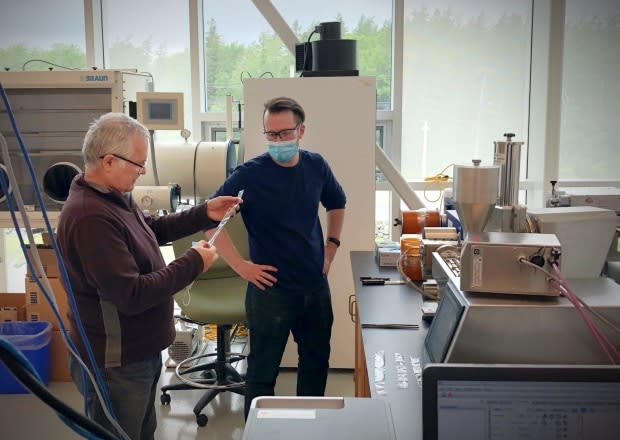Researchers working on virus-killing plastic packaging
Researchers from Nova Scotia are teaming up with New Brunswick scientists to develop antiviral packaging to prevent the spread of COVID-19.
Dr. Beth Mason, CEO of the Verschuren Centre at Cape Breton University, said her team is studying how to embed tiny particles into plastic that would kill the coronavirus on contact.
A team of New Brunswick scientists will then build on that work to develop a coating that could be sprayed on other packaging, like cardboard.
Mason says most viruses and bacteria, including the coronavirus that causes COVID-19, have a protective coating "that makes them really difficult to kill."
But certain nano-metallic compounds can disrupt the lipid membrane — or coating. That causes the virus to dehydrate and die.
Mason's team is trying to embed those virus-killing compounds into plastics. The idea is that when the coronavirus lands on the packaging, "the active compound will disrupt the protective coating of the virus."

The first step in the research is to find the right molecules to embed, explained Mason. The next step is to ensure that the compound can survive the high temperatures that it takes to make plastic.
"So if we can't embed it successfully, can we just add it as a coating?" said Mason.
Within a couple of months, Mason said she hopes her team will have identified some compounds that a team in New Brunswick can use to develop a coating.
"And then all successful candidates will get sent to a virology lab where they'd actually test the efficacy on COVID-19," she said.
Mason's team already has a number of compounds identified, including small-scale copper, that could effectively burst the lipid membrane of viruses.
The team also has experience embedding compounds into plastic packaging.
"So we're working on two ideas," said Mason. "One is ... embedding protection within the plastic itself, and the other is to create a plasticized coating. So for anything that it can't be embedded into, we're looking at a spray-on coating."
That coating could then be applied to cardboard, for example.
Mason said the trick is to not change the properties of the plastic. She said that's especially important for clear food packaging.

Imagine, for example, if the packaging on a T-bone steak gave it a tinge of green or grey.
"So that's the biggest challenge — is to get something that's functional and then to get something that doesn't disrupt the existing properties of the plastics themselves," said Mason.
The other important consideration with food packaging is to ensure it's safe. After all, the food it comes into contact with is eventually consumed by humans.
"We only want it to be able to kill the viruses. We don't want it to have any noxious properties to people who are touching the packaging," said Mason.
She said she's getting a lot of interest from people around the world, "which makes me think that a lot of people might be a little bit fed up with washing their groceries when they get them."
The Atlantic director of the Retail Council of Canada said it's great that Maritimers are working on projects to help slow the spread of COVID-19.
But Jim Cormier suspects that retailers will want to reserve judgment on the technology until they hear about the associated costs.
"Packaging is meant to encompass only a tiny fraction of the cost of a product," said Cormier.
The question is whether the consumer is willing to pay more?
"Would they be willing to pay more for potential health benefits or would they prefer to pay less and then wipe down the packaging when they get home."
Mason said her team is trying to "minimize what the additional cost would be." The goal, she said, is to keep any price increase under five per cent.
"The question back to the consumer would be, 'What price would you pay if it meant that you had a product that gave greater safety and also meant that you could bring your groceries home and you don't have to wash everything?'." said Mason.
Is it really needed?
Ken Whitehurst, the executive director of the Consumer Council of Canada, said he hasn't heard any scientific evidence to suggest that the coronavirus is commonly spread on consumer goods. So he's not sure consumers will be eager to pay more for packaging.
And even if the packaging proves effective at killing the virus, he wonders whether there might be unintended consequences if the nanoparticles end up in the environment.
"There's all kinds of this technology that requires careful study to understand the marketplace efficacy and the intended and unintended consequences, " said Whitehurst.


